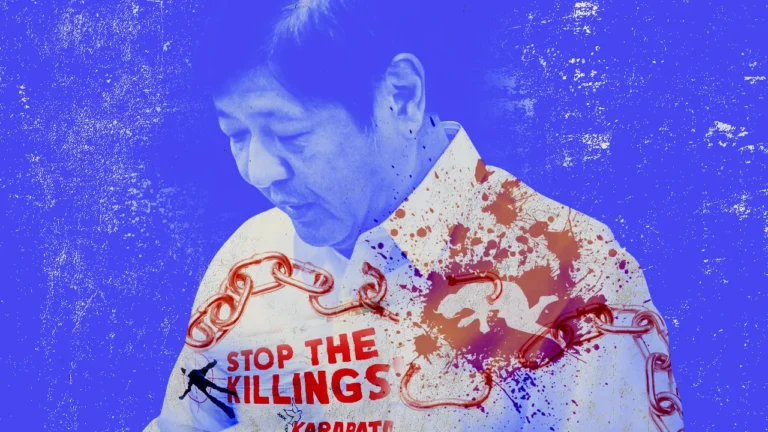
Sep 8, 2023
Carlos H. Conde
We hope the European Union will publicly and unequivocally rectify its positions and send a strong message to Philippine authorities that progress in bilateral relations depends on progress in human rights
I will provide an overview of the main human rights concerns in the Philippines, starting with the “war on drugs,” but focusing not only on that, and expose how impunity for those abuses remains the norm.
While the new administration has been less confrontational and more diplomatic than the previous one, that does not mean that the human rights situation in the country has improved. We encourage the European Union, in all its components, to remain focused on the situation on the ground, and not on the rhetoric or vague promises by the administration.
Better rhetoric on human rights is welcome, but the government also needs to walk the talk, and I’m sorry to say that, so far, it has not.
Here is the overview:
First, despite President Ferdinand Marcos Jr. saying publicly that the “war on drugs” initiated by his predecessor, Rodrigo Duterte, will have a “new face” aimed at drug rehabilitation, drug-related extrajudicial killings have continued. Notably, Marcos has not rescinded the executive issuances that provide wide authority to the police to conduct anti-drug raids and operations, and that are effectively the legal basis used by the police to try to justify unlawful killings.
According to independent monitoring by the University of the Philippines’ Third World Studies Center, 397 people have been killed in “drug-related violence” since June 30, 2022, the first day of the Marcos administration, up to August 31 this year – on average about one fatality each day.
Accountability for these killings has not been a priority for either the Duterte administration or this administration. Of the total deaths – estimates range from 6,252, according to official police figures, to more than 30,000, according to domestic human rights groups – only two cases have resulted in convictions of the assailants. The police claim they investigated 300 killings but only filed charges against 52 police officers – these cases are still pending. A vast majority of deaths remain uninvestigated.
Finally on this point, the Philippine government, including President Marcos, has denounced the International Criminal Court’s investigation into possible crimes against humanity related to “drug war” killings under Duterte. Marcos is an ally of Duterte, whose daughter serves as vice president of the Philippines. The Philippine government has vowed not to cooperate with the ICC investigation but at the same time is doing very little to secure accountability through domestic avenues.
Second, the Philippine government continues to target leftist political activists, civil society leaders and perceived critics with threats, judicial harassment and at times violence. This abuse often takes the form of “red-tagging,” labelling critics as supporters of the communist New People’s Army insurgents. The red-tagging is often followed by the filing of trumped-up charges and, in some cases, terrorism prosecutions. Domestic rights groups have expressed concern about the misuse of the Anti-Terrorism Law of 2020 to harass political activists.
The government task force on insurgency is often behind red-tagging. Some officials – such as Justice Secretary Crispin Remulla – also red-tag groups. Remulla has red-tagged Human Rights Watch in remarks to the press in mid-July 2023. Not even the Duterte administration did what the Marcos government is doing now. Officials have often used red-tagging to target union leaders and their supporters, by harassing them at their homes to dissuade them from joining unions. Teachers, judges, lawyers, and journalists, have likewise been red-tagged.
Absence of UN monitoring
Former senator Leila de Lima, the chief critic of the “drug war,” remains in police detention for more than seven years now, facing bogus drug charges. Cases against the news site Rappler and its CEO Maria Ressa are ongoing.
Pressure by international actors remain crucial to improve the human rights situation in the Philippines.
Please note that, as we speak, there is no UN monitoring of the situation in the Philippines. There is a UN Joint Program (UNJP) but that’s a technical cooperation program aimed at capacity-building, not monitoring the situation in the country.
We have urged the UN Human Rights Council members, including EU member states, to remedy that and to change the mandate of the UNJP, so that it includes a monitoring and reporting component.
As we speak, the GSP+ monitoring by the EU is the only international reporting mechanism on human rights in the Philippines. We understand the EU reports are expected in a matter of weeks.
We don’t know how the trialogue for the GSP+ reform will proceed, and we hope there will be a reform. But in any case the Philippines remains bound by the GSP+ human rights obligations, and will remain so probably for years, for however long it will take to conclude negotiations for a Free Trade Agreement.
Take more vocal approach
Until then, it is crucial that the EU takes a much more vocal approach, and that it states clearly and publicly:
- what specific actions are expected by the government of the Philippines to comply with their GSP+ obligations;
- what will be the consequences in case of failure to comply; and
- what actions need to be taken by the government so that the Commission, the Parliament and the Council can actually consider concluding and ratifying the Free Trade Agreement.
This is all the more necessary after the uncritical visit by President von der Leyen, and we hope the EU will publicly and unequivocally rectify its positions and send a very strong message to the Philippine authorities that progress in bilateral relations, including trade, depends on progress in human rights. And that there are consequences for persistent abuses and impunity. – Rappler.com
Carlos H. Conde, senior Philippine researcher of Human Rights Watch, delivered this opening statement during the September 7, 2023 hearing of the European Parliament’s Subcommittee on Human Rights in Brussels. The piece was slightly edited for brevity.